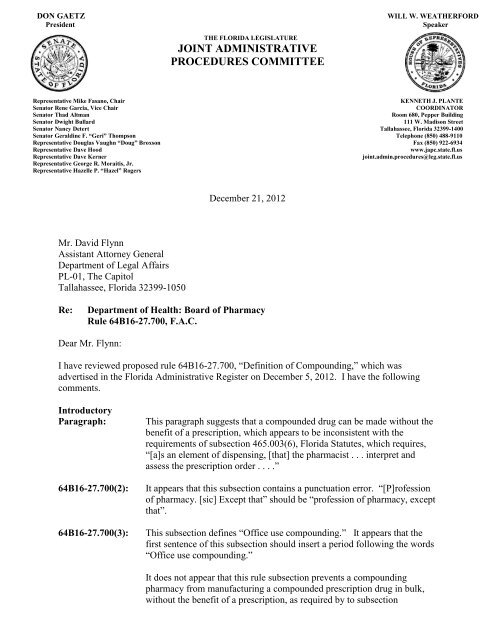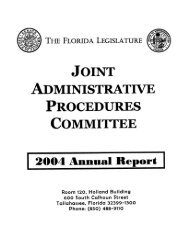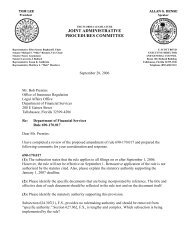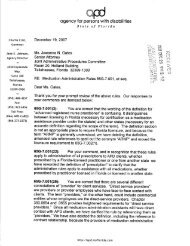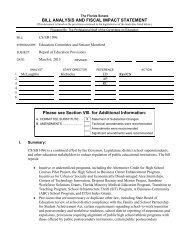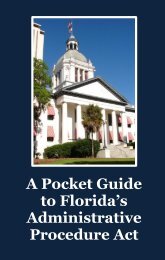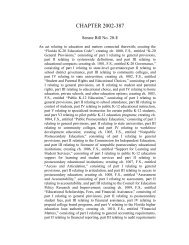Letter from JAPC to Agency - Joint Administrative Procedures ...
Letter from JAPC to Agency - Joint Administrative Procedures ...
Letter from JAPC to Agency - Joint Administrative Procedures ...
Create successful ePaper yourself
Turn your PDF publications into a flip-book with our unique Google optimized e-Paper software.
DON GAETZ WILL W. WEATHERFORD<br />
President<br />
Speaker<br />
THE FLORIDA LEGISLATURE<br />
JOINT ADMINISTRATIVE<br />
PROCEDURES COMMITTEE<br />
Representative Mike Fasano, Chair<br />
KENNETH J. PLANTE<br />
Sena<strong>to</strong>r Rene Garcia, Vice Chair<br />
COORDINATOR<br />
Sena<strong>to</strong>r Thad Altman<br />
Room 680, Pepper Building<br />
Sena<strong>to</strong>r Dwight Bullard<br />
111 W. Madison Street<br />
Sena<strong>to</strong>r Nancy Detert Tallahassee, Florida 32399-1400<br />
Sena<strong>to</strong>r Geraldine F. “Geri” Thompson Telephone (850) 488-9110<br />
Representative Douglas Vaughn “Doug” Broxson Fax (850) 922-6934<br />
Representative Dave Hood<br />
www.japc.state.fl.us<br />
Representative Dave Kerner<br />
joint.admin.procedures@leg.state.fl.us<br />
Representative George R. Moraitis, Jr.<br />
Representative Hazelle P. “Hazel” Rogers<br />
December 21, 2012<br />
Mr. David Flynn<br />
Assistant At<strong>to</strong>rney General<br />
Department of Legal Affairs<br />
PL-01, The Capi<strong>to</strong>l<br />
Tallahassee, Florida 32399-1050<br />
Re:<br />
Department of Health: Board of Pharmacy<br />
Rule 64B16-27.700, F.A.C.<br />
Dear Mr. Flynn:<br />
I have reviewed proposed rule 64B16-27.700, “Definition of Compounding,” which was<br />
advertised in the Florida <strong>Administrative</strong> Register on December 5, 2012. I have the following<br />
comments.<br />
Introduc<strong>to</strong>ry<br />
Paragraph:<br />
64B16-27.700(2):<br />
64B16-27.700(3):<br />
This paragraph suggests that a compounded drug can be made without the<br />
benefit of a prescription, which appears <strong>to</strong> be inconsistent with the<br />
requirements of subsection 465.003(6), Florida Statutes, which requires,<br />
“[a]s an element of dispensing, [that] the pharmacist . . . interpret and<br />
assess the prescription order . . . .”<br />
It appears that this subsection contains a punctuation error. “[P]rofession<br />
of pharmacy. [sic] Except that” should be “profession of pharmacy, except<br />
that”.<br />
This subsection defines “Office use compounding.” It appears that the<br />
first sentence of this subsection should insert a period following the words<br />
“Office use compounding.”<br />
It does not appear that this rule subsection prevents a compounding<br />
pharmacy <strong>from</strong> manufacturing a compounded prescription drug in bulk,<br />
without the benefit of a prescription, as required by <strong>to</strong> subsection
Mr. David Flynn<br />
December 21, 2012<br />
Page 2<br />
465.003(6), Florida Statutes, and selling it directly <strong>to</strong> the practitioner, who<br />
ultimately administers the compounded drug <strong>to</strong> the patient. It appears that<br />
this may be contrary <strong>to</strong> state and federal laws, which the board is charged<br />
with enforcing in section 465.0155, Florida Statutes. See, e.g., Ch. 465<br />
and 499, Fla. Stat; 21 U.S.C. 205.3(d), (f), and (g); 21 U.S.C. § 353a.<br />
The second sentence provides that a “pharmacist may dispense and deliver<br />
a quantity of a compounded drug <strong>to</strong> a practitioner for office use by the<br />
practitioner in accordance with this [rule] section provided:” and the<br />
subsection thereafter includes several paragraphs.<br />
The word “dispense” is a term of art defined in subsection 465.003(6),<br />
Florida Statutes, and means “the transfer of possession of one or more<br />
doses of a medical drug by a pharmacist <strong>to</strong> the ultimate consumer or her<br />
or his agent.” (Emphasis added). The text of rule subsection (3) appears<br />
<strong>to</strong> contemplate that the practitioner is the recipient of the drug <strong>from</strong> the<br />
compounding pharmacy, and the practitioner will ultimately administer<br />
the compounded drug <strong>to</strong> the ultimate consumer or her or his agent. See<br />
Fla. State. Oriental Med. Ass’n v. Slepin, 971 So. 2d 141 (Fla. 1 st DCA<br />
2007) (providing discussion of the elements of actual and apparent<br />
authority necessary <strong>to</strong> create an agency relationship). See also<br />
§ 465.003(1), Fla. Stat. (defining “administration”). If that is the case, it<br />
does not appear that the compounded drug is “dispensed” <strong>to</strong> the<br />
practitioner. It appears this subsection contravenes this statute. See<br />
§ 120.52(8)(c), Fla. Stat.<br />
Further, it appears that rule paragraphs (3)(a), (b), (c), (d), and (e)<br />
contravene the provisions of chapters 465 and 499, Florida Statutes.<br />
Paragraphs (3)(a), (b), and (c) authorize a pharmacist <strong>to</strong> deliver<br />
compounded drugs <strong>to</strong> a practitioner for office use provided:<br />
(a) The quantity of compounded drug does not exceed<br />
the amount a practitioner anticipates may be used in the<br />
practitioner’s office before the expiration date of the drug;<br />
(b) The quantity of compounded drug is reasonable<br />
considering the intended use of the compounded drug and<br />
the nature of the practitioner’s practice;<br />
(c) The quantity of compounded drug for any practitioner<br />
and all practitioners as a whole, is not greater than an<br />
amount the pharmacy is capable of compounding in<br />
compliance with pharmaceutical standards for identity,<br />
strength, quality, and purity of the compounded drug that<br />
are consistent with United States Pharmacopoeia guidelines<br />
and accreditation practices.
Mr. David Flynn<br />
December 21, 2012<br />
Page 3<br />
Rule paragraph (3)(d) requires the pharmacy and practitioner <strong>to</strong> enter in<strong>to</strong><br />
a written agreement and specifies what must be contained in the<br />
agreement. Rule paragraph (3)(e) states the records that must be<br />
maintained of all compounded drugs ordered by practitioners for office<br />
use. None of these paragraphs requires a record of a prescription or an<br />
identifiable patient name <strong>to</strong> be provided <strong>to</strong> the compounding pharmacist.<br />
Thus, the rule text fails <strong>to</strong> require the practitioner who receives the<br />
compounded drug for office use <strong>to</strong> provide the compounding pharmacist<br />
with an identifiable patient for whom the drug is compounded. If the<br />
compounded drug is ordered for office use absent a prescription <strong>to</strong> an<br />
identifiable patient, there does not appear <strong>to</strong> be a valid agency relationship<br />
between the ultimate consumer (the patient) and the practitioner who<br />
purchases the compounded drug. As stated above, it appears that when a<br />
pharmacy delivers the compounded prescription drug <strong>to</strong> the practitioner,<br />
the compounded drug is not “dispensed” <strong>to</strong> the ultimate user or her or his<br />
agent.<br />
Instead of dispensing the drug <strong>to</strong> the ultimate consumer or her or his agent,<br />
it appears the pharmacy selling and delivering a compounded drug <strong>to</strong> the<br />
practitioner for office use is distributing the drug <strong>to</strong> a person other than the<br />
consumer or the consumer’s agent. Selling compounded prescription<br />
drugs <strong>to</strong> a practitioner for office use appears <strong>to</strong> constitute the wholesale<br />
distribution of a prescription drug. See § 499.003(54), Fla. Stat.<br />
Accordingly, it appears that a pharmacy selling compounded prescription<br />
drugs for administration <strong>to</strong> patients is a wholesale distribu<strong>to</strong>r, which is<br />
defined in subsection 499.003(55) as:<br />
[A]ny person engaged in wholesale distribution of<br />
prescription drugs in or in<strong>to</strong> this state, including, but not<br />
limited <strong>to</strong>, manufacturers; repackagers; own-label<br />
distribu<strong>to</strong>rs; jobbers; private-label distribu<strong>to</strong>rs; brokers;<br />
warehouses, including manufacturers’ and distribu<strong>to</strong>rs’<br />
warehouses, chain drug warehouses, and wholesale drug<br />
warehouses; independent wholesale drug traders; exporters;<br />
retail pharmacies; and the agents thereof that conduct<br />
wholesale distributions.<br />
(Emphasis added). See also § 499.01(1)(d) and (2)(d), Fla. Stat.<br />
Generally, “wholesale distribution” is defined in subsection 499.003(54),<br />
Florida Statutes, as the “distribution of prescription drugs <strong>to</strong> persons other<br />
than a consumer or patient.”<br />
The term “distribution” is defined in subsection 499.003(17), Florida Statutes,<br />
as follows:
Mr. David Flynn<br />
December 21, 2012<br />
Page 4<br />
“Distribute” or “distribution” means <strong>to</strong> sell; offer <strong>to</strong> sell;<br />
give away; transfer, whether by passage of title, physical<br />
movement, or both; deliver; or offer <strong>to</strong> deliver. The term<br />
does not mean <strong>to</strong> administer or dispense and does not<br />
include the billing and invoicing activities that commonly<br />
follow a wholesale distribution transaction.<br />
Therefore, it appears that pharmacies selling compounded drugs for office<br />
use which are not prepared pursuant <strong>to</strong> a specific patient prescription must<br />
obtain a prescription drug wholesale distribu<strong>to</strong>r permit <strong>from</strong> the<br />
Department of Business and Professional Regulation, pursuant <strong>to</strong> sections<br />
499.01(1)(d) and (2)(d), Florida Statutes, and rule 61N-1.015(7)(e),<br />
Florida <strong>Administrative</strong> Code. Alternatively, it appears that these<br />
pharmacies could obtain a retail pharmacy drug wholesale distribu<strong>to</strong>r<br />
permit pursuant <strong>to</strong> sections 499.01(1)(f) and (2)(f), and rule 61N-<br />
1.015(7)(f), Florida <strong>Administrative</strong> Code, which would authorize transfers<br />
between a retail pharmacy and a health care practitioner licensed in this<br />
state and authorized by law <strong>to</strong> dispense or prescribe prescription drugs.<br />
See § 499.01(2)(f)4., Fla. Stat. If that is correct, please include this<br />
requirement in the rule text. See § 120.52(8)(c), Fla. Stat.<br />
Further, it does not appear that the exception <strong>to</strong> the definition of “wholesale<br />
distribution” contained in paragraph 499.003(54)(e), Florida Statutes, for the<br />
“lawful dispensing of a prescription drug in accordance with chapter 465”<br />
applies <strong>to</strong> this rule, because, as previously stated, this rule subsection does<br />
not provide for the lawful dispensing of compounded drugs <strong>to</strong> the ultimate<br />
consumer or <strong>to</strong> her or his agent. See § 465.003(6), Fla. Stat. It appears<br />
these paragraphs contravene chapters 465 and 499, and exceed the board’s<br />
grant of rulemaking authority. See § 120.52(8)(b) and (c), Fla. Stat.<br />
Also, absent the pharmacy obtaining the appropriate permit, it appears it<br />
would be unlawful for a practitioner <strong>to</strong> administer compounded drugs that<br />
are not prepared for an identifiable patient or pursuant <strong>to</strong> a valid patient<br />
prescription. Section 499.005, Florida Statutes, states in part:<br />
It is unlawful for a person <strong>to</strong> perform or cause the<br />
performance of any of the following acts in this state:<br />
* * *<br />
(4) The sale, distribution, purchase, trade, holding, or<br />
offering of any drug, device, or cosmetic in violation of this<br />
part.<br />
* * *<br />
(14) The purchase or receipt of a prescription drug <strong>from</strong> a<br />
person that is not authorized under this chapter <strong>to</strong> distribute<br />
prescription drugs <strong>to</strong> that purchaser or recipient.
Mr. David Flynn<br />
December 21, 2012<br />
Page 5<br />
(15) The sale or transfer of a prescription drug <strong>to</strong> a person<br />
that is not authorized under the law of the jurisdiction in<br />
which the person receives the drug <strong>to</strong> purchase or possess<br />
prescription drugs <strong>from</strong> the person selling or transferring<br />
the prescription drug.<br />
* * *<br />
(22) Failure <strong>to</strong> obtain a permit or registration, or operating<br />
without a valid permit when a permit or registration is<br />
required by this part for that activity.<br />
Section 499.005, Florida Statutes, also states it is unlawful for a person <strong>to</strong><br />
perform or cause the following acts in this state:<br />
(2) The adulteration or misbranding of any drug, device, or<br />
cosmetic.<br />
(3) The receipt of any drug, device, or cosmetic that is<br />
adulterated or misbranded, and the delivery or proffered<br />
delivery of such drug, device, or cosmetic, for pay or<br />
otherwise.<br />
A prescription drug is considered adulterated, if, among other reasons, it<br />
“has been purchased, held, sold, or distributed at any time by a person not<br />
authorized under federal or state law <strong>to</strong> do so.” See § 499.006(10), Fla.<br />
Stat. C.f. § 499.0051(12)(a) and (b), Fla. Stat. (providing criminal<br />
penalties for the “manufacture, repackaging, sale, delivery, or holding or<br />
offering for sale of any drug that is adulterated or misbranded” and for the<br />
“adulteration or misbranding of any drug intended for further<br />
distribution.”).<br />
It also appears that rule subsection (3) may conflict with the compounding<br />
pharmacist’s professional duty <strong>to</strong> exercise her or his professional<br />
judgment in dispensing a compounded drug based on a prescription <strong>to</strong> an<br />
identifiable patient, as stated in subsection 465.003(6), Florida Statutes:<br />
As an element of dispensing, the pharmacist shall, prior <strong>to</strong><br />
the actual physical transfer, interpret and assess the<br />
prescription order for potential adverse reactions,<br />
interactions, and dosage regimen she or he deems<br />
appropriate in the exercise of her or his professional<br />
judgment, and the pharmacist shall certify that the<br />
medicinal drug called for by the prescription is ready for<br />
transfer. The pharmacist shall also provide counseling on<br />
proper drug usage, either orally or in writing, if in the<br />
exercise of her or his professional judgment counseling is<br />
necessary.
Mr. David Flynn<br />
December 21, 2012<br />
Page 6<br />
(Emphasis added). If a compounding pharmacist is not preparing a drug<br />
pursuant <strong>to</strong> a valid prescription <strong>to</strong> an identifiable patient, then it appears<br />
that drugs distributed by the pharmacy <strong>to</strong> the practitioner are not unlike<br />
drugs practitioners receive <strong>from</strong> drug manufacturers and wholesalers.<br />
The pharmacist’s duty is reiterated by possible disciplinary actions that<br />
may be imposed upon pharmacy permittees, codified in paragraph<br />
465.023(1)(h), Florida Statutes:<br />
(1) The department [of health] or the board may revoke or<br />
suspend the permit of any pharmacy permittee, and may<br />
fine, place on probation, or otherwise discipline any<br />
pharmacy permittee if the permittee, or any affiliated<br />
person, partner, officer, direc<strong>to</strong>r, or agent of the permittee,<br />
including a person fingerprinted under s. 465.022(3), has:<br />
* * *<br />
(h) Dispensed any medicinal drug based upon a<br />
communication that purports <strong>to</strong> be a prescription as defined<br />
by s. 465.003(14) or s. 893.02 when the pharmacist knows<br />
or has reason <strong>to</strong> believe that the purported prescription is<br />
not based upon a valid practitioner-patient relationship that<br />
includes a documented patient evaluation, including his<strong>to</strong>ry<br />
and a physical examination adequate <strong>to</strong> establish the<br />
diagnosis for which any drug is prescribed and any other<br />
requirement established by board rule under chapter 458,<br />
chapter 459, chapter 461, chapter 463, chapter 464, or<br />
chapter 466.<br />
See also § 465.015(2)(c), Fla. Stat. (stating it is unlawful for a pharmacy<br />
<strong>to</strong> sell or dispense drugs without first being furnished with a prescription);<br />
Fla. Admin. Code R. 64B16-30.001(2)(e)1.f.(i) and (ii) (imposing<br />
penalties for violating § 465.015(2)(c), Fla. Stat.).<br />
Please explain whether this rule subsection contravenes the pharmacist’s<br />
duties as provided in chapter 465, Florida Statutes. See § 120.52(8)(c),<br />
Fla. Stat.<br />
64B16-27.700(3)(d): This rule paragraph requires the pharmacy and practitioner <strong>to</strong> enter in<strong>to</strong> a<br />
written agreement. Please provide statu<strong>to</strong>ry authority for this agreement.<br />
Absent such authority, the rule is invalid. See §§ 120.52(8) and<br />
120.536(1), Fla. Stat. (“A grant of rulemaking authority is necessary but<br />
not sufficient <strong>to</strong> allow an agency <strong>to</strong> adopt a rule; a specific law <strong>to</strong> be<br />
implemented is also required. An agency may adopt only rules that<br />
implement or interpret the specific powers and duties granted by the<br />
enabling statute.”).
Mr. David Flynn<br />
December 21, 2012<br />
Page 7<br />
Further, please advise what entity is responsible for enforcing this written<br />
agreement and against whom. See, e.g., Lennar Homes, Inc. v. Dep’t of<br />
Bus. and Prof’l Regulation, 888 So. 2d 50 (Fla. 1 st DCA 2004) (holding<br />
generally that an agency cannot interpret contracts between parties without<br />
statu<strong>to</strong>ry authority <strong>to</strong> do so); Peck Plaza Condo. v. Div. of Fla. Land Sales<br />
and Condos., 371 So. 2d 152 (Fla. 1 st DCA 1979) (same).<br />
As always, please let me know if you have any questions. Otherwise, I look forward <strong>to</strong> your<br />
response.<br />
Sincerely,<br />
Marjorie C. Holladay<br />
Senior At<strong>to</strong>rney<br />
MCH:SA WORD/MARJORIE/64B16_27.700LS122112_152792


